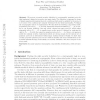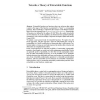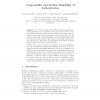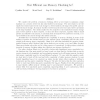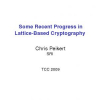101
Voted
TCC
2009
Springer
16 years 2 months ago
2009
Springer
Existing definitions of program obfuscation do not rule out malleability attacks, where an adversary that sees an obfuscated program is able to generate another (potentially obfus...
131
click to vote
TCC
2009
Springer
16 years 2 months ago
2009
Springer
This paper considers two questions in cryptography. Cryptography Secure Against Memory Attacks. A particularly devastating side-channel attack against cryptosystems, termed the &qu...
104
Voted
TCC
2009
Springer
16 years 2 months ago
2009
Springer
We address one of the foundational problems in cryptography: the bias of coin-flipping protocols. Coin-flipping protocols allow mutually distrustful parties to generate a common u...
115
Voted
TCC
2009
Springer
16 years 2 months ago
2009
Springer
We propose a general security definition for cryptographic quantum protocols that implement classical non-reactive two-party tasks. The definition is expressed in terms of simple q...
108
Voted
TCC
2009
Springer
16 years 2 months ago
2009
Springer
Extractable functions are functions where any adversary that outputs a point in the range of the function is guaranteed to "know" a corresponding preimage. Here, knowledg...
107
Voted
TCC
2009
Springer
16 years 2 months ago
2009
Springer
Various results show that oblivious transfer can be implemented using the assumption of noisy channels. Unfortunately, this assumption is not as weak as one might think, because i...
126
Voted
TCC
2009
Springer
16 years 2 months ago
2009
Springer
Abstract. Protocols for deniable authentication achieve seemingly paradoxical guarantees: upon completion of the protocol the receiver is convinced that the sender authenticated th...
126
Voted
TCC
2009
Springer
16 years 2 months ago
2009
Springer
We consider the problem of memory checking, where a user wants to maintain a large database on a remote server but has only limited local storage. The user wants to use the small ...
87
Voted
TCC
2009
Springer
16 years 2 months ago
2009
Springer
119
Voted
TCC
2009
Springer
16 years 2 months ago
2009
Springer
We study the complexity of securely evaluating arithmetic circuits over finite rings. This question is motivated by natural secure computation tasks. Focusing mainly on the case o...


